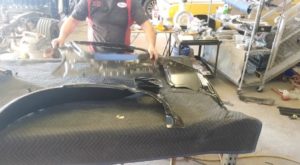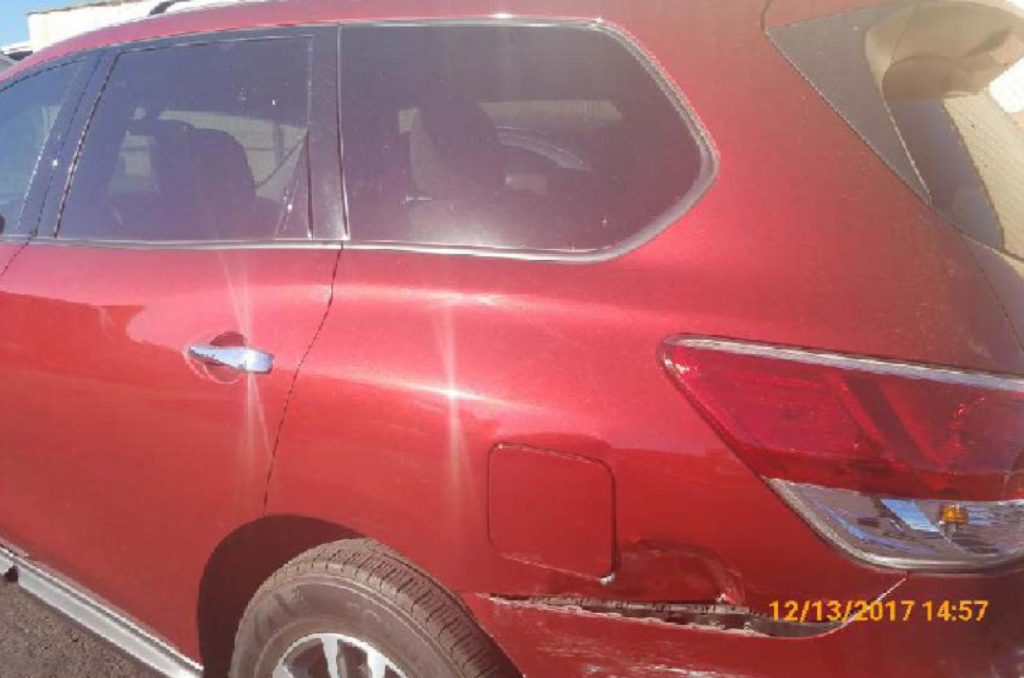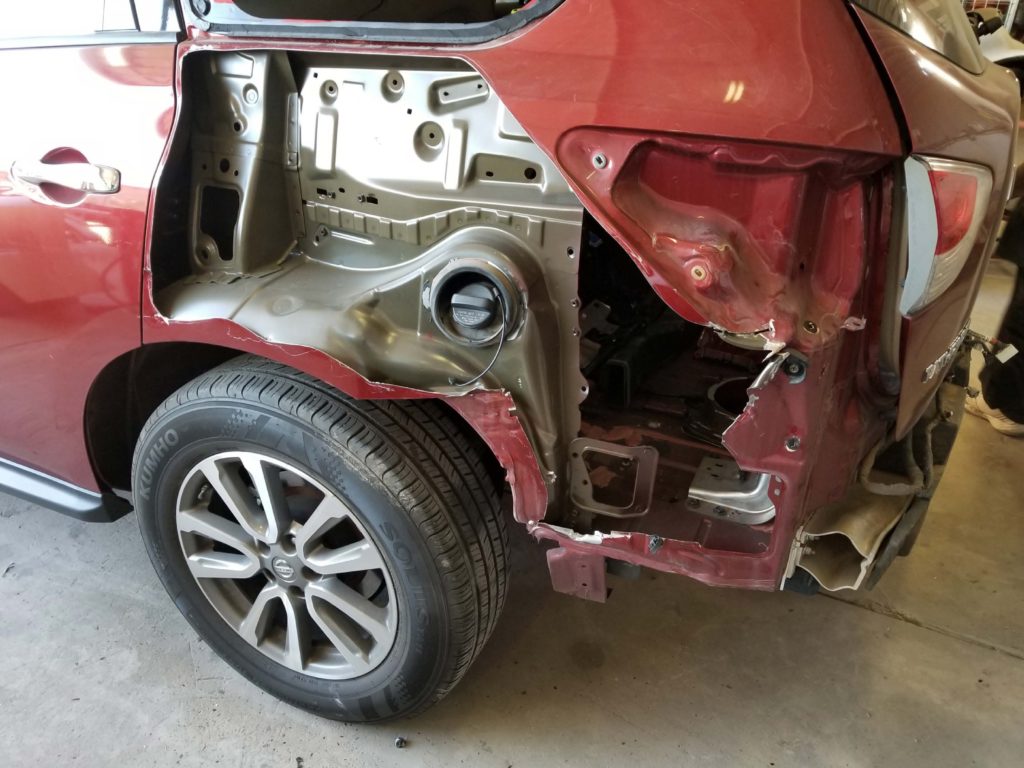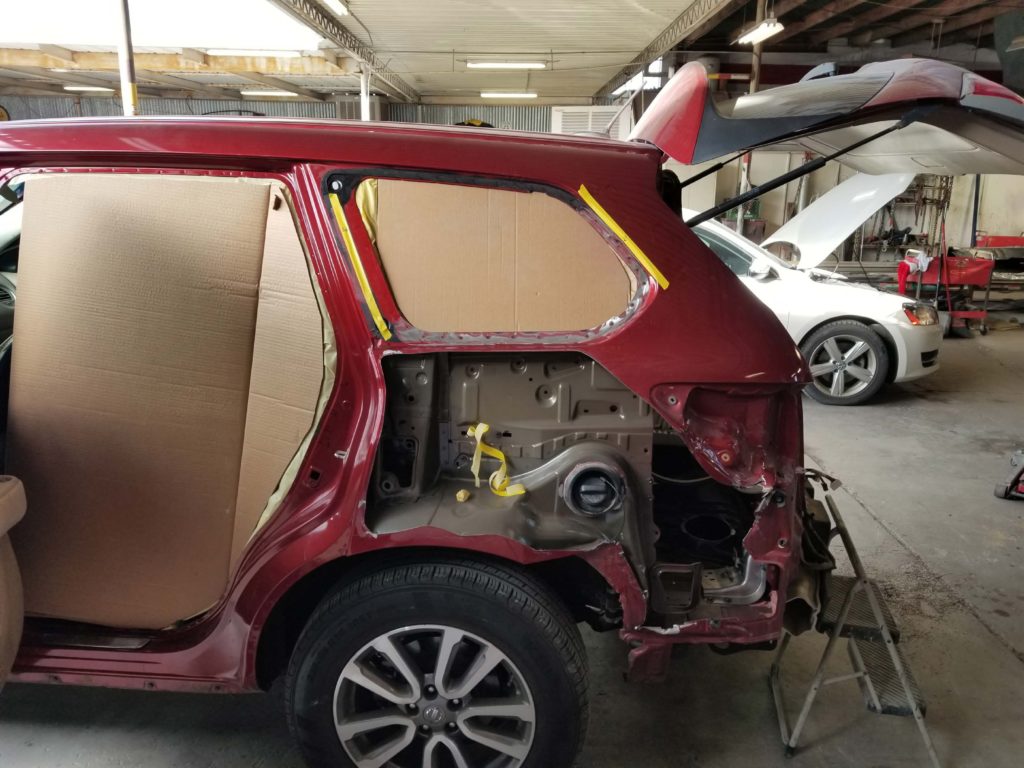
Ariz. couple sues State Farm in used Nissan quarter panel, appraisal clause dispute
By onBusiness Practices | Insurance | Legal | Repair Operations | Technology
An Arizona couple has sued State Farm for breach of contract and a lack of good faith over the insurer’s alleged behavior on their 2013 Nissan Pathfinder auto body repair claim.
State Farm refused to cover a new quarter panel and new outer wheel well on Jason and Melissa Wilhelm’s Pathfinder following a December 2017 crash, according to Coachworks Auto Body body shop manager Matt Radman.
Instead, the insurer allegedly demanded that the Wilhelms’ body shop, the Mesa, Ariz.-based Coachworks, replace the two separate parts with a recycled quarter panel and wheel well salvaged as a single, joined unit from a donor vehicle. The insurer claimed this recycled assembly could be attached as a single unit for an acceptable repair, according to Radman.
The vehicle construction makes the proposal impossible, according to Radman, who explained this position in a March video comparing installing new parts and a recycled Pathfinder quarter panel-wheel well assembly. (The video uses the word “LKQ,” but Radman said he was using this term as a generic synonym for a recycled part rather than a reference to the LKQ Corporation.)
Radman said he had previously offered a similar explanation to State Farm unsuccessfully.
The insurer also allegedly agreed to the couple’s invocation of the appraisal clause to settle the dispute — then reversed itself.
The Wilhems are alleging breach of contract and breach of the insurer’s good faith duty over both situations. Wilhelm v. State Farm is scheduled for trial in Maricopa County, Ariz., Superior Court on Aug. 31, 2021.
Typically, large corporations don’t comment on pending litigation. State Farm counsel did not reply to a request for comment, and the company itself said it had nothing to share for the article.
State Farm denied in a Nov. 15, 2019, court filing it had ever agreed to the appraisal clause, though it did report receiving a message from Melissa Wilhelm stating, “As per my policy to protect consumers, please accept this letter as my notice to you of evoking my appraisal clause at this time.”
The insurer denied it had breached the contract or failed to act with good faith and fair dealing regarding the repair and appraisal clause.
Recycled quarter panel impossible?
State Farm’s suggested repair overlooks the engineering of the Pathfinder’s quarter panel, according to Radman, who in the March video described the structure as a series of overlapping metal components. It must be rebuilt from the inside out using multiple replacement parts, he says in the video. Attempting to incorporate State Farm’s proposed components into the existing vehicle assembly was effectively impossible for reasons including juggling the various overlapping parts and access, according to Radman.
Radman in the video said the repair also was impossible because “the tool to remove the spot weld is greater than the allowed size” of the 8 mm welds required for reassembly.
“When you change that size … you’re really changing the way this sheet metal is supposed to crush, tear, rip” to protect occupants in a crash, Radman said in the March film.
State Farm refused to budge, according to Radman. He estimated he spoke to about a half dozen insurer personnel and even got the Wilhelms’ insurance agent involved.
Radman said the agent mentioned he had worked for a couple of decades in State Farm claims and said he had never seen a claim handled so poorly.
“Three years ago, the Wilhelms asked State Farm to pay a body shop estimate to perform procedures recommended by Nissan’s Autobody Repair Manual to repair the crushed rear quarter of their Nissan Pathfinder,” the Wilhelms wrote in a Jan. 4 court filing. “State Farm slashed that estimate in half by specifying the use of a full rear-quarter assembly saw-cut from a salvage yard vehicle. The body shop notified State Farm that Nissan had strictly prohibited such a repair technique in writing and refused to perform it. … The body shop’s master mechanic told State Farm’s adjuster that its repair would weaken structural components of Nissan’s crash-tested safety systems and make it more likely that the vehicle could explode or fail to protect rear seat occupants in a subsequent collision. State Farm has refused to pay one penny more than its repair estimate based on its contention that it was prepared to rebut the positions taken by the manufacturer and the body shop that its specified repair method was unsafe.”
Nissan OEM procedures for the 2013 Pathfinder provided by Radman show repairers weld locations and weld counts on the various parts within the quarter panel. They don’t specifically offer a weld size or spell out the reassembly process, according to Radman. He said he measured the original vehicle to conclude the weld hole should be 8 mm.
State Farm’s initial Jan. 19, 2018, estimate was $4,819.88. Coachworks’ preliminary Jan. 5, 2018, sheet was $12,942.35. Three years later, Radman in March assessed the repair at $21,114.12.
Nissan has since at least 2016 has also told the collision industry it “DOES NOT approve of the repair of our vehicles with salvage parts or assemblies.” (Emphasis Nissan’s.) Another 2016 position statement on structural and unibody repairs advises body shops:
Nissan North America recommends that if structural repairs are needed on a vehicle, they only be performed by an experienced professional with proper tools, while using a current Nissan body repair manual for reference. Component replacement should be accomplished only along factory seams where sectioning is appropriate and approved within the body repair manual. Failure to adhere to this recommendation can result in a number of problems, including improperly fitting parts, noises, excessive tire wear, and most importantly, changes in the way the vehicle reacts in subsequent crashes.
State Farm sought more time to find expert
Both sides battled earlier this year over a State Farm request for more time to find an expert witness.
“State Farm should have disclosed a substantive defense of a repair using a salvaged rear quarter clip in February 2020 when its initial disclosures were due – but it did not,” the Wilhelms wrote Jan. 4. “In April 2020, State Farm stipulated that it would fully disclose any expert opinions supporting its repair by November 12, 2020. Plaintiffs generously agreed to allow State Farm 14 months from the date of the lawsuit to disclose an expert justification that it should have had when it denied payment. Plaintiffs also reluctantly agreed to disclose their expert opinions 30 days before State Farm – giving State Farm a strategic advantage it truly wasn’t entitled to here. Then, in a good faith effort to avoid bringing a discovery dispute to this Court, plaintiffs stipulated to a 60-day extension of this critical deadline – giving State Farm until January 11, 2021 to finally disclose a substantive expert defense. The plaintiffs (a working-class family of six) have timely disclosed an expert opinion that is identical to the position articulated by the body shop three years ago. State Farm (the largest auto insurer in the world), having failed to disclose a substantive defense as required by Rule 26.1, and having already secured a stipulated 60-day extension of its expert deadline, now asks the Court for 90 more days (120 days after plaintiffs’ completed disclosure) to find an expert to support a repair procedure it should have been prepared to defend when it was specified.”
State Farm told the court Jan. 4 said it needed more time to figure out why Audatex would produce two different estimates.
“After this litigation began, Plaintiff made a novel argument that State Farm committed bad faith because its repair estimate proposed an unsafe repair,” State Farm wrote. “State Farm disputes this, and this allegation has required the defense investigate how the Audatex software and State Farm’s estimate did not specify an unsafe repair. Moreover, the mechanic used the same exact software but reached a different result. State Farm has been investigating this software and requires additional time to demonstrate why an unsafe repair was never proposed, either through the software or through human decision. Finally, State Farm is looking for witnesses to explain‘ how this software works.”
The Wilhelms described Audatex as irrelevant to the dispute. “The Autatex (sic) software did not write State Farm’s repair estimate,” they wrote. “Autatex (sic) is simply a tool that monetizes the judgments human beings make about proper repairs.”
State Farm’s Jan. 4 filing didn’t speak to the time period between February 2020 and the alleged Nov. 12, 2020, deadline. It did say it requested a 90-day extension from the plaintiffs on Nov. 24, 2020, but received no response.
“Undersigned counsel emailed Plaintiff again on December 9, 2020, and received a demand for a meet and confer, which was unsuccessful,” State Farm continued. “Due to the holiday, this hearing has now been scheduled for January 4, 2021, and deadlines have passed during this period. A 90-day extension from the dates in the existing scheduling order would not account for this lapsed time while working through the discovery dispute.”
RTA allegedly approved, then denied
Radman gave the couple the option of paying out-of-pocket or using their appraisal clause — which back then still applied to State Farm repairable claims as well as total losses, he said.
The language described a “problem with the loss,” Radman said.
State Farm originally agreed to the right to appraisal process. The dispute resolution solution typically works in the auto insurance industry as follows:
After reaching an impasse on the amount owed the consumer, either the insurer or policyholder can invoke the appraisal clause. Each side hires an appraiser, and both appraisers agree upon a third appraiser to serve as an “umpire,” with the umpire’s costs split between the policyholder and insurer. If any two out of the three agree on a dollar value for the loss, that amount is binding.
But despite the appraisal clause having been allegedly permitted under the State Farm policy and originally agreed to by the carrier, State Farm reversed itself and refused to engage in the proceedings, according to the lawsuit.
“Plaintiffs’ demand for appraisal and State Farm’s acceptance of that demand created a binding contract to resolve the dispute over the amount of loss to the Vehicle through appraisal,” Wilhelm v. State Farm states.
“State Farm breached the contract to appraise by subsequently refusing to proceed with the appraisal process citing provisions in an amended policy form never provided to the plaintiffs allegedly narrowing the appraisal remedy.”
As noted above, State Farm denies it agreed to the appraisal clause and these other appraisal-related assertions in the lawsuit.
Breach of contract and lack of good faith alleged
This and the insurer’s refusal to cover a safe and proper repair constituted breach of contract, according to the lawsuit.
“State Farm’s conduct, as alleged in the General Allegations herein, breached numerous express and implied provisions in the Insurance Contract including the provisions requiring State Farm to pay the amounts necessary to reasonably repair collision damage to the Vehicle so as to restore the Vehicle to its pre-accident condition.
“State Farm’s breach of its express promise to resolve disagreements as to the amount of loss to the Vehicle through the appraisal process was also a breach of a contract agreement between plaintiffs and State Farm.”
The lawsuit alleged both actions represented a breach of the implied obligation of good faith and fair dealing.
“State Farm’s refusal to pay for obvious unrepaired collision damage caused by the December 2017 accident was outrageous and indefensible acts of bad faith that were a gross deviation from any and all recognized standards of practice in the insurance industry for the fair handling of first-party collision damage claims under automobile policies in the State of Arizona, or anywhere else in the country.
“State Farm’s breach of its express promise to resolve disagreements as to the amount of loss to the Vehicle through the appraisal process was also a breach of State Farm’s duty of good faith and fair dealing.
“There was no reasonable or good faith basis for State Farm’s conduct as alleged herein. State Farm’s conduct was intentional and was done with full knowledge that the conduct would cause significant harm to its insureds, Jason and Melissa Wilhelm.”
According to the litigation, State Farm has a duty under the policy contract “to treat the plaintiffs fairly and to evaluate and respond to their claim in good faith, giving the plaintiffs’ interests equal consideration to State Farm’s own interests.”
Damages
The Wilhelms are seeking redress including attorney’s fees, punitive damages, and the more than $100,000 they owe Coachworks in storage charges over the three years State Farm has allegedly refused to budge on reimbursement. According to State Farm, Coachworks charges $100 a day for storage. The lawsuit was filed Sept. 13, 2019.
The mechanic—a non-party to this litigation—now purportedly seeks to recover well over $100,000 in storage fees from Plaintiff and alleges that its storage fees are growing $100 per day,” State Farm wrote. “Plaintiff is using the mechanic’s claim to justify a damages award against State Farm for over $100,000 plus punitive damages. Because of that allegation, this is not a run-of-the-mill repair case.”
At first, the couple was “mad at me,” Radman said. But he said that once he outlined his position, the ire switched to State Farm. The realization arose: “‘They’re screwing me over,'” Radman said.
“Because of State Farm’s conduct in refusing to pay amounts necessary to properly repair the vehicle and its breach of its agreement to resolve the dispute through appraisal, the plaintiffs have been unable to secure repairs to their Vehicle. As a direct result of State Farm’s wrongful conduct, Coach Works has asserted a possessory lien on the plaintiffs’ vehicle, and the plaintiffs have been unable to remove their Vehicle from Coach Works’ facility and have incurred colossal and devastating storage charges imposed by Coach Works.
“The plaintiffs have now lost the use of their Vehicle for over 21 months, causing them to incur insurance premiums and loan payments on a vehicle that they cannot drive and causing them to incur inconvenience, expense and hardships in securing transportation necessary to maintain their personal and professional lives.”
Originally a third-party claim
Ironically, State Farm wouldn’t have even found itself embroiled in this dispute had it not been for the actions of rival GEICO, according to Radman.
Radman said the Wilhelms initially attempted to file a third-party claim with GEICO, which insured the driver who struck them.
Coachworks wrote the Jan. 5, 2018, sheet for $12,942.35 that it later provided to State Farm. Radman said it told GEICO this was merely a preliminary sheet and a supplement was possible. GEICO came in at about $9,000 and refused to consider any supplement, according to Radman.
“They pretty much on their own stopped the claim,” Radman said. GEICO’s view was that the Wilhelms should file a first-party claim with their own insurer instead, he said.
GEICO has not responded to a Monday request for comment on the allegations.
Asked if the customer considered suing the at-fault party directly, Radman said she didn’t want to get into the litigation process.
Images:
“2013 Nissan Pathfinder OEM vs. LKQ left rear Quarter panel with inner structural parts.”
Matt Radman on YouTube, March 10, 2021
Featured images: The 2013 Nissan Pathfinder at the center of the Wilhelm v. State Farm case. (Provided by Coachworks Auto Body)



